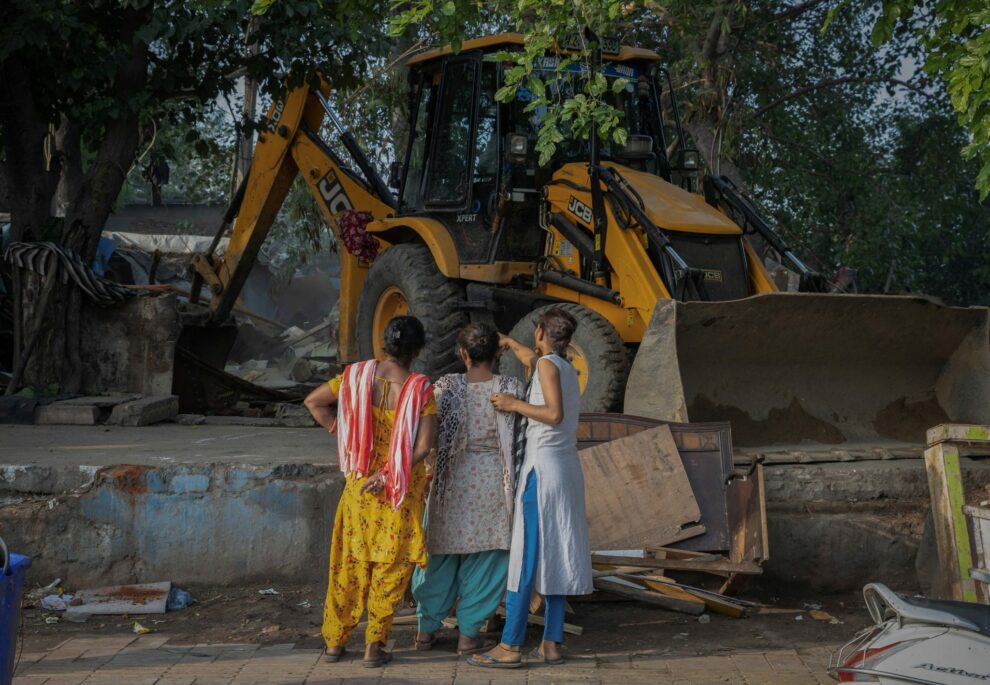Indian Prime Minister Narendra Modi opened the 2023 G20 Summit in New Delhi by stating that ‘India’s G20 presidency has become a symbol of inclusion … it has become a People’s G20’. This rhetoric gels well with the repeated adage that India is the world’s largest democracy and a bulwark of political freedom against expanding Chinese authoritarianism.
In reality, Modi’s leadership has advanced a politics of occlusion, implementing wide-ranging policies that erode political freedoms and silence advocates of inclusivity. To see this politics of occlusion at work, one need look no further than the eviction of beggars and hiding of slums that took place in the lead up to the G20 summit.
There also exists a more longstanding pattern of property destruction and forced evictions of Muslim communities, which has increased under Modi and his Bharatiya Janata Party’s (BJP) promotion of Hindu nationalism.
The inauguration of a new parliament building in New Delhi — an event described by Prime Minister Modi as ‘evidence of [a] self-reliant India’ and a symbol of the people’s aspiration — is further evidence of Modi’s politics of occlusion. Critics point to the building as instead symbolic of further democratic backsliding in India, arguing that the ceremonious opening was used as another performative opportunity to promote divisive politics. This view is supported by the boycotting of the opening by opposition parties, as well as Prime Minister Modi inaugurating the building without participation from India’s President Droupadi Murmu.
While the inauguration of a building may seem relatively inconsequential to democratic processes and free speech, the decision to go ahead with the opening in the face of strong opposition demonstrates the BJP’s deepening suppression of political debate.
Since the BJP came to power in 2014, thousands of non-governmental organisations (NGOs) across India have faced increasing scrutiny over perceived criticism of government policies. Organisations have had their offices raided by state investigative agencies, while legislative changes have bolstered state power over civil society.
In 2020, Amnesty International was forced to close down its operations in the country following multiple raids on its offices and the freezing of its bank accounts. In 2022 Oxfam India had computers and staff mobile phones confiscated during raids on its offices based on accusations that it was acting as a vehicle for foreign interference in Indian politics.
This followed the 2021 decision not to renew Oxfam’s operating license, along with the licences of more than 6000 other foreign and domestic NGOs. Even environmental organisations such as Greenpeace have had their operating licenses cancelled, with the government labelling their conservation advocacy as ‘anti-development’.
For domestic civil society organisations, attacks on political freedoms have become commonplace. On the same day that central agencies raided Oxfam’s offices, India’s Centre for Policy Research, a leading public policy think tank, was also raided. When its operating licence was cancelled in March 2023, almost 100 international researchers and scholars issued an open letter to Modi’s government. They highlighted the dangerous precedent this set for the pursuit of research and independent judgment and urged the government to restore the license.
The Missionaries of Charity, a religious congregation founded by Nobel laureate Mother Teresa in 1950, was also denied a renewal of its licence in 2021. While this license was later restored after international outcry, nearly 400 NGOs lost their licenses between 12 August 2022 and 26 March 2023. This follows approximately 20,000 NGOs losing their licenses to receive foreign funds in 2016, and a further 6000 NGOs losing theirs on 1 January 2022. This drastic reduction has diminished India’s total number of NGOs with valid licenses to receive foreign funds to only 16,383, down from 33,000 in 2016.
This repression of the public sphere has also had a notable impact on India’s ranking in global democracy and freedom indexes. In Freedom House’s latest World Freedom Index, India was rated 66 of 100 countries and categorised as partly free, while V-Dem recently labelled India ‘one of the worst autocratisers’ of the last 10 years. In 2022, Civicus added India to its monitoring watchlist, categorising civic liberties as ‘repressed’.
2023 saw India drop to 161 of 180 countries in the World Press Freedom Index. This comes after the BBC’s Indian headquarters were raided following the release of a documentary that was critical of Prime Minister Modi, and the enactment of emergency laws that have shut down internet services in different parts of the country 420 times since 2019.
Supporters of Modi’s rhetoric of inclusion may point to India’s parallel hosting of a ‘C20’ forum for civil society organisations alongside the G20 summit. As one of the official engagement groups of the G20, the C20 was designated as a platform for civil society organisations around the world to voice people’s aspirations directly to world leaders. But before too much is made of the C20, consideration must also be given to the police blockading of 2023’s earlier ‘We20’ civil society forum and the alleged prevention of hundreds of participants from attending.
As far back as 2016, three UN Special Rapporteurs on human rights defenders, freedom of expression and freedom of association issued a joint statement expressing their concerns over increased state silencing in India. These concerns have proved accurate. With the G20 now behind us, India’s diplomatic partners have much work to do in holding Modi accountable for his politics of occlusion.
Source : East Asia Forum









